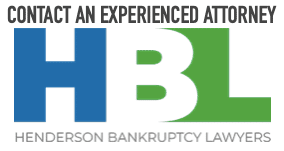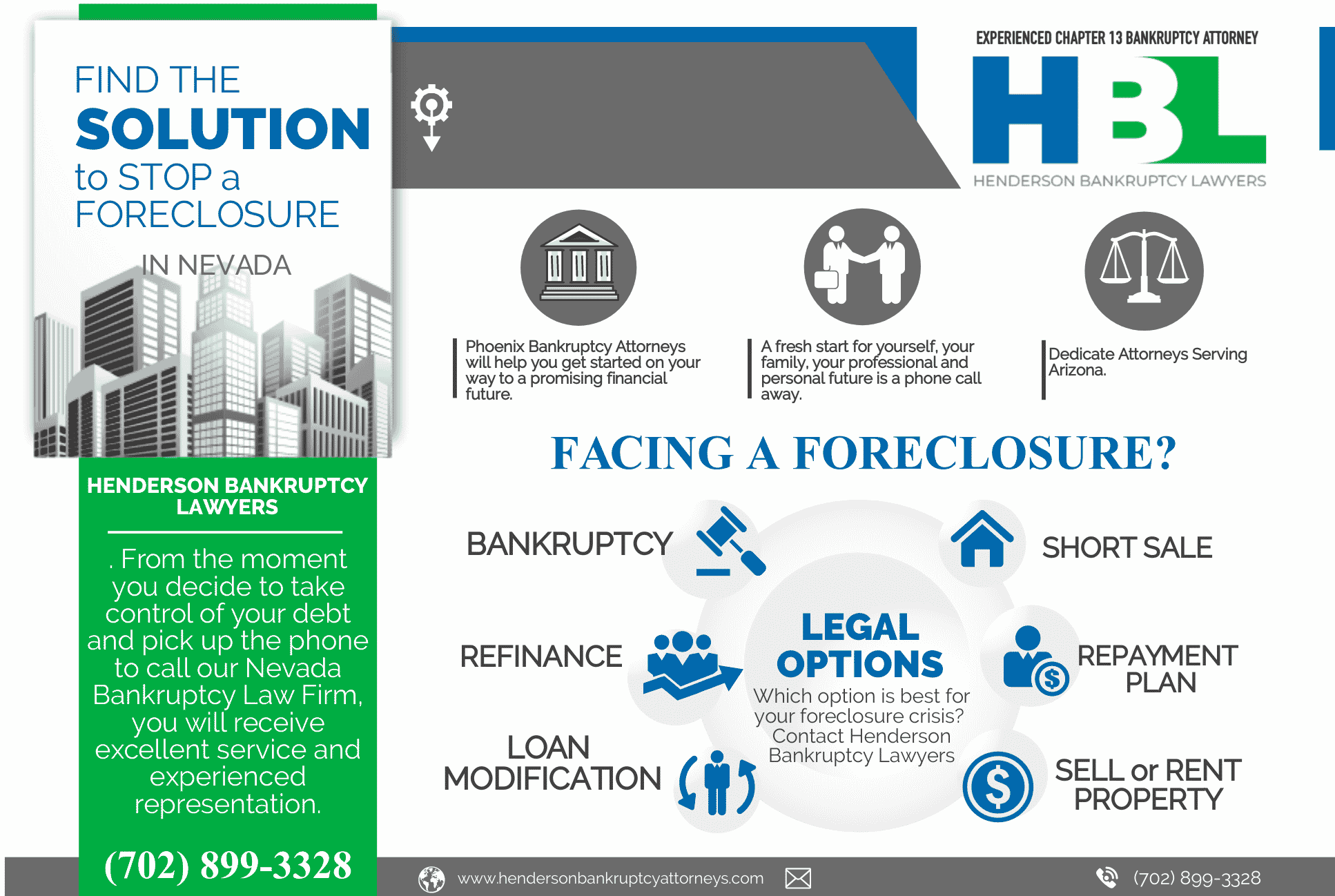NEVADA CHAPTER 13 BANKRUPTCY ATTORNEYS IN HENDERSON
Use Chapter 13 Bankruptcy in Nevada to Save Your Home From Foreclosure
HENDERSON CHAPTER 13 BANKRUPTCY FAQs
ANSWER:
Chapter 13 Bankruptcy, or a wage earner’s bankruptcy, reorganizes debts into a 3 or 5 year repayment plan. Certain types of debts will be paid in full in your plan, while others may only be partially paid before being discharged. A trustee will oversee your case and administer payments to your creditors. As long as your case is active, i.e., you stay current on your payments, you will be shielded from your creditors by the Automatic Stay. Creditors may not garnish your wages or bank account, or repossess your home or vehicle until your case is discharged or dismissed.
ANSWER:
Chapter 13 reorganizes your debts into a payment plan, while Chapter 7 simply clears away many types of debts. However, Chapter 13 allows for payments of debts that aren’t addressed in Chapter 7, like familial obligations, student loans, and some taxes. A Chapter 7 will have a greater negative impact on your credit, and will remain on your credit report for longer than a Chapter 13. Chapter 7 bankruptcies typically only last 4-6 months, while a successful Chapter 13 will always last 3-5 years. In Chapter 7, you will only need to attend one hearing known as a 341 Meeting of Creditors. You will have to attend this hearing in a Chapter 13 too, as well as a confirmation hearing for your payment plan.
ANSWER:
To file Chapter 13, you will need to first draft a bankruptcy petition. Your petition will list all the property you own, any unexpired leases you have, your debts, your income, and other factors that could affect your financial situation. You will need to prepare a mailing matrix of all of your creditors, along with a proposed schedule for your payment plan. Before filing these documents with the court, you need to complete a credit counseling course. You must file your course completion certificate with the rest of your bankruptcy documents. Your case will be assigned a trustee, and dates for your 341 Meeting of Creditors and confirmation hearing. You must begin payments within 30 days of filing, regardless of whether or not your confirmation hearing has been held yet. You will also need to take a second credit counseling course within 60 days of your 341 Meeting of Creditors. From that point on, you will simply continue payments for the rest of the plan period. If you do so successfully, your case will be discharged.
ANSWER:
Yes. You will need to attend 2 different hearings for your Chapter 13 Bankruptcy. One of these is your 341 Meeting of Creditors. Your creditors have the option to appear at this hearing and make objections or requests regarding your case, but this is uncommon. You will also need to attend a confirmation hearing, where the trustee will confirm that your plan meets all the applicable requirements.
ANSWER:
There are three costs associated with Chapter 13 Bankruptcy: (1) the filing fee of $310; (2) the fees for your credit counseling courses, which are typically $30 each or less; and (3) your attorney’s fees. Attorney’s fees can vary based on the area you are in, your case details, and the attorney’s rates. Your attorney may be able to take a down payment and work the rest of their fees into your payment plan.
ANSWER:
All of your creditors will receive a notification when you file your Chapter 13 petition. So will any cosigners on your loans, as well as the holder of any lease you intend to break. If you are being garnished, you will need to provide your employer with your case number to stop the garnishment. Anyone else can look for your name in the bankruptcy filings, but won’t be personally notified.
ANSWER:
Because you actually repay most of your debts in a Chapter 13, it has a smaller impact on your credit than a Chapter 7. If you have a low credit score, you might not even see a decrease when your case is first filed. You should check with your attorney to see if they will run a credit report for you that projects your credit score one year after filing.
ANSWER:
A Chapter 13 Bankruptcy will remain on your credit for 7 years from the filing date.
ANSWER:
A Chapter 13 Repayment Plan pays your debt in a certain order. The first debts to be paid are your attorney’s and trustee fees. The next to be paid are secured debts. The most common secured debts are mortgages and auto loans. Any past due balance on your mortgage or vehicle will be paid, as well as the full balance of any vehicle loans. Your mortgage doesn’t need to be paid in full in the plan. Once secured debts are paid, your priority debts will be paid. These are taxes, child support, alimony, and wages to employees, among others. Finally, unsecured non-priority debts will be paid in the plan. Debts from the last category, like credit cards and medical bills, may not need to be paid in full in the plan if you can’t afford to with your income.
ANSWER:
The length of your payment plan depends on your income relative to the state median for your family size. In Nevada, that amount starts at $4,370.75 per month for a single filer. It increases $5,479.67, $6,238.00, $6,794.00, and so on for each added family member. If the filer’s income exceeds the state median, their payment plan will be 5 years. If they are below that line, their plan will be 3 years.
ANSWER:
You will need to calculate your disposable monthly income to determine how much your payments will be. Mandatory expenses like taxes, involuntary and some voluntary deductions, secured debts, and care expenses for a family member will be subtracted from your average monthly income. Your payment plan will be calculated based on how much disposable monthly income you have. If you have enough disposable monthly income to pay your secured and priority debts, but not enough for unsecured debts, some of those may be discharged without repayment.
ANSWER:
Credit card debts are unsecured non-priority debts, so they will only be worked into your plan as your disposable monthly income allows. Any unpaid credit card debt at the end of your plan will be discharged.
ANSWER:
No. Student loans are unsecured, non-priority debts and will be paid along with the rest of the fourth tier creditors if possible. However, unlike other unsecured non-priority debts, student loans won’t be discharged at the end of a Chapter 13 plan. If the filer’s disposable monthly income isn’t high enough to pay any of the student loans, it will continue to accrue interest but the lender can’t garnish the filer’s wages or pursue collection in any other way.
ANSWER:
Back taxes are a priority debt, so they must be paid in full in a Chapter 13 plan. They will be in the third tier of creditors. The advantage of using Chapter 13 to resolve your tax debts is that you will have 3-5 years to catch up, and you will be protected from garnishments, liens, and other methods of collection while your case is active.
ANSWER:
Yes. Your mortgage payment may be included in your payment plan, depending on your jurisdiction and if you were behind on payments. If you fail to make your mortgage payments, your lender may file a Motion for Relief from the Automatic Stay. If this motion is granted, your home lender can proceed with a foreclosure despite the protections of the Automatic Stay.
ANSWER:
You will be ineligible for a home loan for 2 years from the filing date of your bankruptcy. However, your plan could extend 1-3 years beyond that date. You will need permission from the court to incur new debts during your Chapter 13 bankruptcy. A drastic change in living costs could throw off your payment plan, so consult your attorney if you wish to buy a new home during a Chapter 13 bankruptcy.
ANSWER:
Technically, you don’t need an attorney to file a personal bankruptcy. That doesn’t mean you’ll be successful. Approximately 33% of pro se (self-represented) Chapter 7 bankruptcies are dismissed. That might be a chance worth taking, especially for someone with experience with legal and financial issues. The same can’t be said for Chapter 13. More than 99% of pro se Chapter 13 bankruptcies end in dismissal. Unless you think you are part of the less than 1% of people who can have their debts discharged in Chapter 13 on your own, you need an experienced bankruptcy attorney to represent you.


